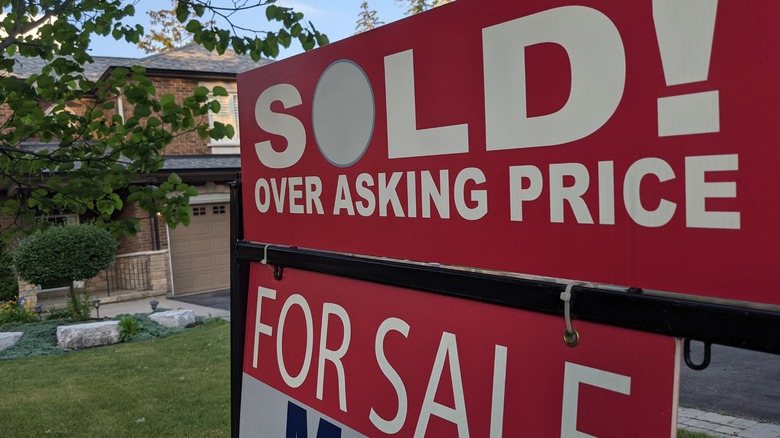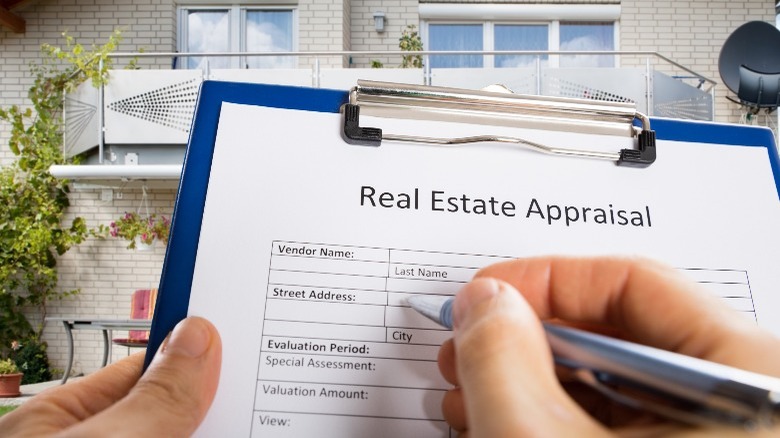How Appraisals Impact Homebuyers
A real estate appraisal is a key part of the transaction if you are using a mortgage to buy, sell, or refinance a property. Lenders want to make sure that homeowners are not overborrowing for a property because the home serves as collateral for the mortgage, according to Investopedia. If the borrower defaults on the mortgage, the lender will sell the home to recoup the money it lent. The appraisal helps the bank protect itself against lending more than it might be able to recover in this worst-case scenario. It also reassures the buyers that they have not overpaid for the home. Typically, a mortgage loan cannot exceed a certain percentage of the appraised value of the house.
After a purchase offer has been accepted and a home inspection conducted, a buyer completes a mortgage application which lets the lender know the buyer intends to proceed with the transaction, per Chase. In addition to reviewing the buyer's financial information, the lender orders an appraisal of the property. A home appraisal costs between $300 and $800 depending on the size of the property and is paid for by the buyer as part of the closing costs. Most state laws require that an independent, licensed or certified third-party appraiser conduct a property appraisal.
Appraisals compare a house to recently sold houses
An appraiser looks at the square footage, features and condition of a property and compares its value to other similar, recently sold homes in the neighborhood, also known as "the comps." In traditional appraisals, the appraiser must perform a complete, on-site inspection of the interior and exterior and note any conditions that adversely affect the property's value, such as needed repairs. Sometimes a discrepancy can happen if the appraiser doesn't know the local real estate market or if there is an error in any of the reported information. A seller's agent should provide the appraiser with a list of recently sold homes in their client's neighborhood that are similar and support the contract price. The sellers and homebuyers should always review the report with their agents to make sure there are no inconsistencies or errors, for example, listing the incorrect square footage or number of bedrooms.
If the appraisal comes in at or above the contract price, the transaction proceeds as planned, per Investopedia. In 2021, one in five homes (20%) had a purchase price higher than the appraised value, compared to only 7% of homes in May 2020, according to CoreLogic. The current housing crisis in which buyers' demand far exceeds the availability of inventory of homes for sale has resulted in bidding wars and soaring sales prices above list price.
What is the impact of an appraisal lower than purchase price?
However, when an appraisal comes in below the contract price, it can delay or derail the transaction because it limits the amount a lender will finance, per Rocket Mortgage. This is referred to as an appraisal gap. In the instance of this gap, there are two options for the buyer: pay the difference in price out-of-pocket or negotiate with the seller to lower the price, per Investopedia. The bank won't lend you or any other prospective buyer more than the home is worth. With an appraisal contingency in place, buyers can cancel the contract and receive a full refund of their earnest money deposit.
Over the past two years, the competitive housing market has led some buyers to waive their appraisal contingencies so that their offers will appeal more to the sellers. The appraisal will still occur, but the deal won't fall through if the appraisal comes in lower than the purchase price. If a buyer waives the financing contingency and their loan is not approved or the home isn't appraised at the offer price, it's the buyer's responsibility to make up the difference in cash or walk away from their earnest-money deposit, per Zillow Group. Buyers need to be confident that the amount they're offering is an accurate valuation of the property and that they have extra cash to make up the difference if the appraisal comes back lower, per U.S. News.
A frenzied housing market can lead to a buyer's regret
During the pandemic, a shortage of available appraisers and the need for minimal in-person contact contributed to the Federal Housing Finance Agency allowing "desktop" appraisals, which are expected to continue in 2022. This is when a property valuation is completed at the appraiser's desk, using tax records and information listed on the multiple listing service (MLS) instead of an in-person survey of the property. Desktop appraisals may speed up the appraisal process and cost less than in-person appraisals. However, Appraisal Buzz cautions about the importance of appraisers, lenders, and others involved in real estate transactions working together to ensure the integrity of the information so that there is confidence and reliability for those relying on the processes.
A recent Zillow Group research study revealed that 75% of recent buyers had at least one regret about their new home. Purchasing real estate is often the biggest financial investment in people's lives. Making a snap decision in a frenzied market can lead to a choice people wish they hadn't made, per The New York Times.



